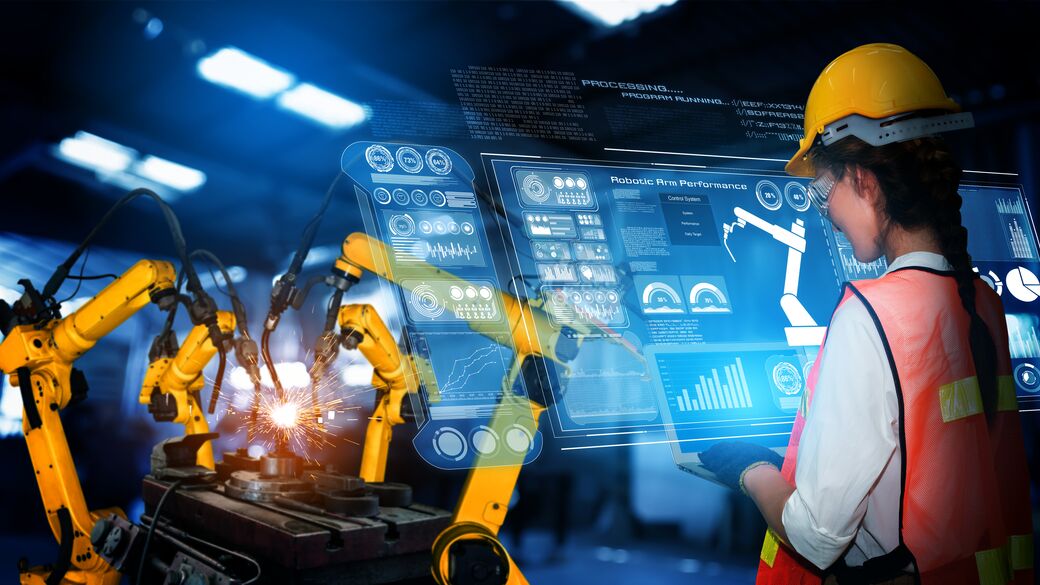
How AI can help manufacturers analyze vast amounts of data, identify patterns, and make informed decisions.
Artificial Intelligence (AI) has emerged as an innovative force in the manufacturing industry, promising to reshape industries and redefine production processes. With its ability to analyze vast amounts of data, identify patterns, and make informed decisions, AI is paving the way for greater productivity and competitiveness. However, despite its immense potential, many companies remain uncertain about what AI can truly do for their organization.
Manufacturing has long been recognized as a data-rich sector, producing vast amounts of data at every stage of production. This data encompasses everything from supply chain logistics and production processes to customer feedback and market trends. The sheer volume and complexity of this data make it challenging for manufacturers to derive actionable insights manually. This is where AI provides value by offering sophisticated algorithms and machine learning capabilities to analyze and interpret this abundance of information.
Organizations are aware of AI's potential but are unsure of how to leverage it effectively within their operations. This uncertainty often stems from a lack of understanding about AI's practical applications and the specific benefits it can deliver and often leads to hesitancy and reluctance to invest in AI initiatives. AI in manufacturing can enhance quality control, predictive maintenance, supply chain management, and much more.
To address this challenge, companies must first recognize that AI is not a one-size-fits-all solution. Instead, it requires a tailored approach that aligns with the organization's own goals, challenges, and resources. This begins with a comprehensive assessment of the current state of operations, identifying areas where AI can drive significant improvements in efficiency and cost-effectiveness.
Data quality is paramount to leveraging the most benefit from AI applications. Analyzing existing data to identify any inconsistencies, errors, or missing values and using data profiling techniques to gain insights into the quality of data will provide a valuable service. Implementing data cleansing techniques to correct errors, remove duplicates, and fill in missing values will help to ensure that data is accurate and reliable.
Furthermore, companies should prioritize education and training initiatives to ensure that employees at all levels understand the capabilities and potential impact of AI. By fostering a culture of curiosity and continuous learning, organizations can empower their teams to embrace AI as a tool for driving improvement and competitive advantage.
From a strategic standpoint, successful AI adoption in manufacturing requires a people-centric approach. While AI can automate routine tasks and augment decision-making, it's essential to upskill employees to work effectively with this technology. This includes training personnel on data analytics, AI interpretation, and cross-functional collaboration.
At the core of this technological revolution lies cognitive ERP – a holistic approach that integrates AI, machine learning, and natural language processing (NLP) into traditional ERP systems. Cognitive ERP not only automates repetitive tasks but also interprets unstructured data, learns from user interactions, and adapts to changing business needs. This cognitive intelligence enables ERP systems to evolve from transactional tools and leverage new capabilities that drive business growth and competitive advantage.
In the context of manufacturing, cognitive ERP serves as a cornerstone for digital transformation. It facilitates seamless data integration across departments and enables agile responses to market dynamics. A cognitive ERP system can analyze historical production data to optimize manufacturing processes, predict maintenance requirements based on equipment sensor data, and recommend personalized product configurations based on customer preferences.
Furthermore, cognitive ERP systems empower manufacturers to embrace emerging technologies such as the Internet of Things (IoT) and Big Data analytics. By orchestrating these technologies within a unified framework, manufacturers can create interconnected ecosystems that drive collaboration and value creation.
Lastly, cognitive ERP invites collaboration across departments by providing a unified view of data and insights, enabling cross-functional teams to make data-driven decisions collaboratively. This fosters a culture of transparency, accountability, and continuous improvement, laying the foundation for long-term business success.
AI is transforming the manufacturing industry by unlocking new levels of efficiency, productivity, and innovation. By adopting a people-centric approach to AI strategy and leveraging cognitive ERP as a cornerstone for business transformation, companies can harness the full potential of AI to drive sustainable growth and competitive advantage. Embracing AI not only empowers employees to work smarter and faster but also positions organizations to thrive in an increasingly complex and dynamic business environment.